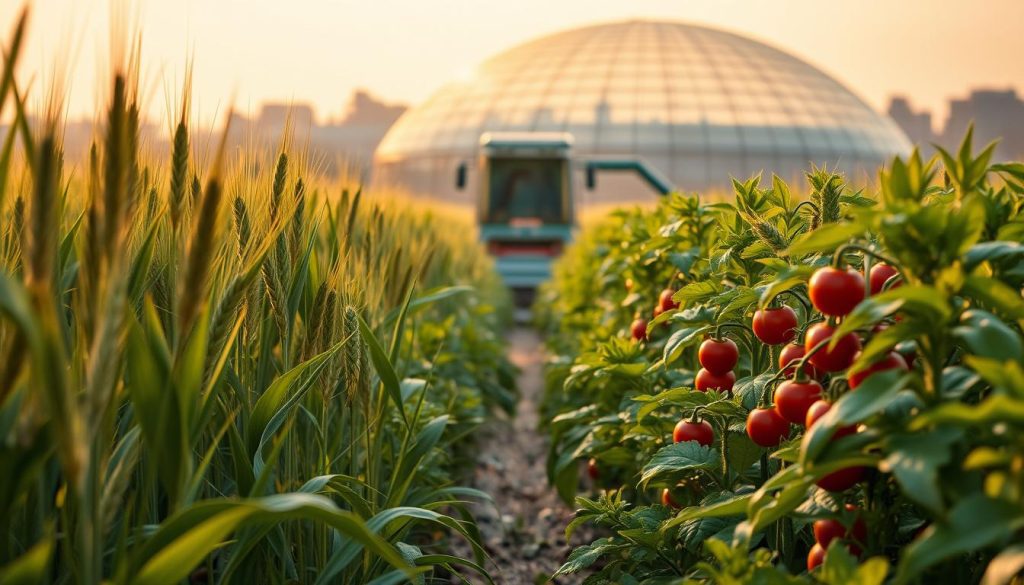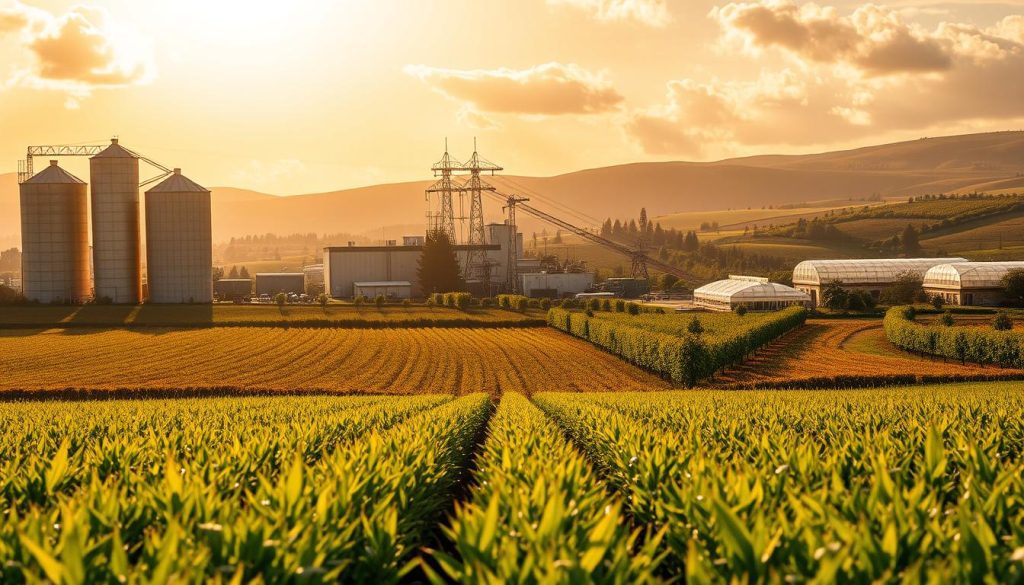The role of biotechnology in farming is growing fast. It is helping solve big food security problems. This field makes crops grow better, fight off diseases, and be more nutritious. It is equally changing how we farm, making it more efficient and green.
Agricultural biotechnology

Looking into agricultural Biotechnology shows its big impact on farming today. It makes it possible for farmers to grow better and more crops. This leads to a future where everyone has enough to eat. The role of biotechnology in farming is huge, and it is changing the industry fast.
Understanding agricultural biotechnology fundamentals
Agricultural biotechnology is key to modern farming. It helps solve food security issues and boosts crop yields. It makes crops more nutritious and resistant to diseases and pests. It uses biotechnology to find new ways for farmers to grow better crops. This helps farmers produce high-quality crops while being friendly to the environment. The farming industry has changed a lot, thanks to agricultural biotechnology. Farmers use genetic engineering, gene editing, and biotechnology breeding. This allows them to grow crops that do well even in tough conditions. This is very important as the world’s population grows for more people means that more food is needed.
Genetic engineering: This involves the use of biotechnology to introduce desirable traits into crops, such as disease resistance or improved nutritional content.
Gene editing: This technique enables scientists to make precise changes to the genetic code of crops, allowing for the development of new crop varieties with enhanced characteristics.
Biotechnology-based breeding techniques: These techniques involve the use of biotechnology to improve the breeding process, enabling farmers to produce high-quality crops more efficiently.
Biotechnology has changed farming a lot, as many farmers now use biotechnology to make their crops better. As biotechnology in agriculture grows, we will see more new ways to farm better and sustainably.
Revolutionary innovations in crop enhancement

Agricultural biotechnology has changed how we grow crops. It uses genetic engineering and gene editing. This has led to crops that grow better, resist diseases, and are more nutritious. For example, genetically modified crops like corn and soybeans fight pests and diseases. This means we can use fewer pesticides and grow more food. There are also new crops that can handle drought and have better nutrition. These changes help solve big food security problems. Additionally, they help farmers to make a better living. Key benefits of crop enhancement through agricultural biotechnology include:
- Improved crop yields and disease resistance
- Reduced need for pesticides and other chemicals
- Enhanced nutritional content of crops
- Increased drought tolerance and climate resilience
- These advancements are big for the future of farming and food, as they show how important agricultural biotechnology is for improving crops
Agricultural biotechnology applications in livestock management
Agricultural biotechnology is more than just for crops. It also helps a lot in managing livestock. It makes farming more efficient and sustainable. By using genetic engineering and gene editing, farmers can make their animals healthier and more productive. Some of the key applications of agricultural biotechnology in livestock management include:
- Genetic improvements in animal breeding to develop animals with improved disease resistance and growth rates
- Biotechnology-based disease diagnosis and treatment to reduce the need for antibiotics and improve animal health
- Biotechnology in animal nutrition to improve feed efficiency and reduce environmental impact
Genetic improvements in animal breeding
Genetic improvements in animal breeding help farmers for they can breed animals that are healthier and grow faster. This makes farming more productive and efficient.
Biotechnology in animal nutrition
Biotechnology in animal nutrition improves how animals digest food. It also reduces harm to the environment. This makes farming more sustainable and efficient.
Environmental impact and sustainability benefits
Agricultural biotechnology can greatly reduce farming environmental impact. It uses genetic engineering and gene editing to create crops that need less pesticides and fertilizers. This helps improve soil health and cuts down on water pollution. For instance, genetically modified crops like Bt corn and soybeans need fewer pesticides. This can be described as a big step forward. Another example is drought-tolerant crops, which need less water, helps save water and improve farming sustainability. These innovations make farming more eco-friendly and reduce its environmental impact. Other benefits of agricultural biotechnology are:
Reduced use of pesticides and fertilizers
Improved soil health
Reduced risk of water pollution
Improved water conservation
By using agricultural biotechnology, farmers can make food production more sustainable. This method reduces farming environmental footprint and boosts crop yields. As the world’s population grows, sustainable farming becomes more critical. Agricultural biotechnology is key to a sustainable food future.
Conclusion
The role of agricultural biotechnology in changing farming is clear. It tackles big issues like food insecurity and protecting the environment. With tools like genetic engineering, farmers can grow crops that are better in many ways. Looking ahead, we will see more breakthroughs in agricultural biotechnology. We will see crops that can handle droughts and animals that fight off diseases better. These advances will surely make farming more sustainable and productive.


